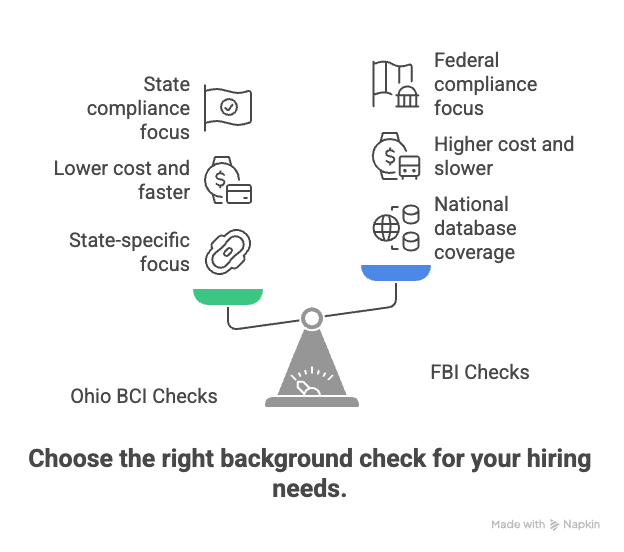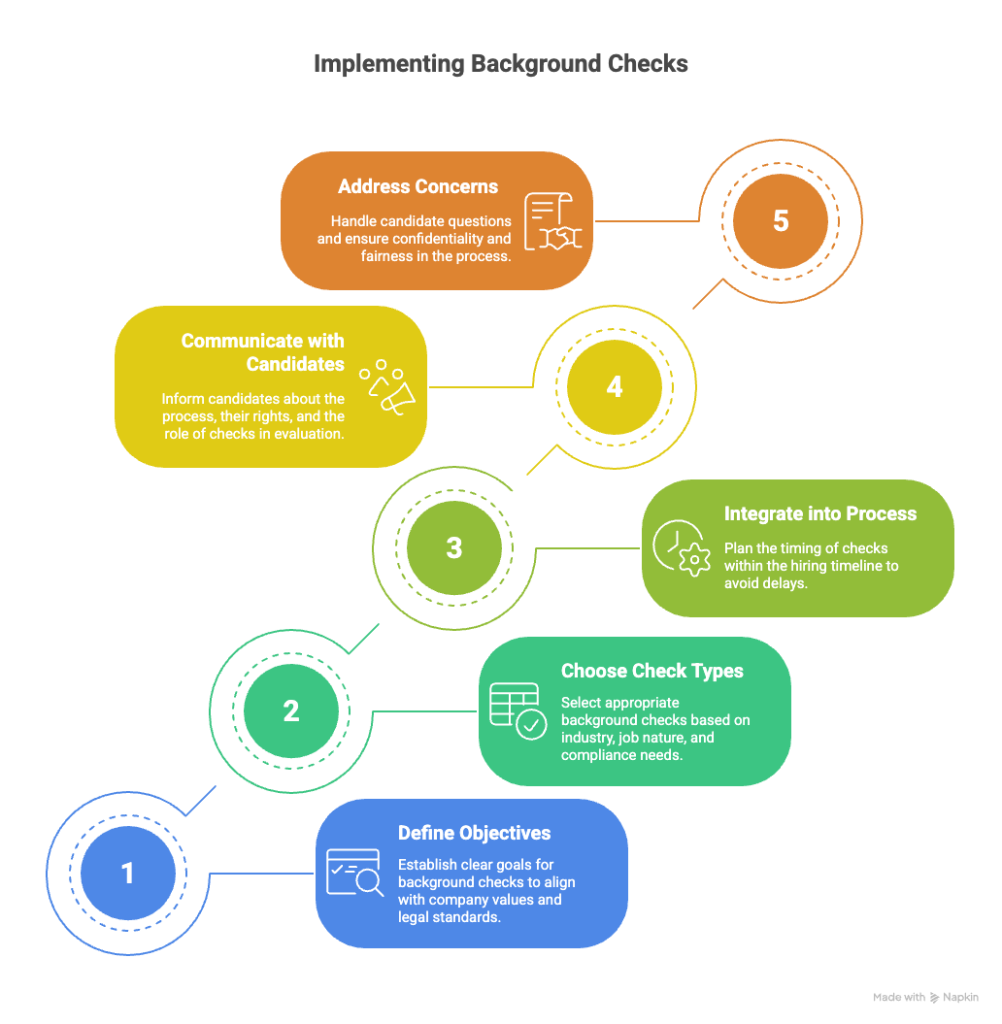Hiring the right candidate for a job is critical for any organization. In Ohio, employers often rely on background checks to ensure that potential employees meet the necessary standards for employment. The two primary options for conducting these checks are through the Ohio Bureau of Criminal Investigation (BCI) and the Federal Bureau of Investigation (FBI). Both have their pros and cons, but understanding the nuances can help employers make informed decisions about which is best for their hiring needs.
This guide will dive deep into Ohio BCI background checks, compare them with FBI checks, and explore their relevance in various employment contexts such as childcare. By the end, youâll have a solid understanding of how these background checks operate and how to navigate the intricacies of pre-employment screening in Ohio.
Key Takeaways
- Background checks are crucial for a safe workplace, preventing the potential hiring of individuals with risky pasts.
- Ohio BCI checks focus on uncovering criminal history within the state, making them ideal for locally focused roles like childcare.
- FBI fingerprinting provides a national perspective on a candidate's criminal background, necessary for roles demanding extensive scrutiny.
- Selecting between Ohio BCI and FBI checks requires evaluating the specific needs of your position, balancing speed and cost with thoroughness.
- Clear communication and adherence to legal and ethical standards are essential throughout the background check process, ensuring transparency and candidate rights.
Introduction
Ever hire someone who seemed great on paper but turned out to be a headache later? Background checks help solve this problem. They're an essential part of the hiring process, making sure that candidates don't just look good, but actually fit the role safely and responsibly. In Ohio, these checks aren't just about ticking a box; theyâre about maintaining a safe workplace and protecting your business from risk.
Your main tools for conducting these checks in Ohio are the Ohio Bureau of Criminal Investigation (BCI) checks and FBI fingerprinting. Each method digs into different areas of a candidateâs history. The Ohio BCI focuses on state-level information, ideal for jobs where local legal compliance is key, while FBI checks offer a broader view, covering national data that can be crucial for specific roles like childcare.
Navigating the process can feel overwhelming. Thatâs why we take a closer look at these tools, comparing their strengths and limitations to help you integrate them effectively into your hiring process. Want to know if your next hire has skeletons in the closet? These checks are your best allies.
Understanding Ohio BCI Background Checks
Ohio BCI background checks are a critical tool for employers looking to ensure workplace safety and integrity. These checks involve reviewing an individualâs criminal history in the state of Ohio. They are particularly useful for gaining state-specific information, such as arrests, convictions, and open warrants within Ohio's jurisdiction.
The process begins with the submission of the applicant's fingerprints. This can be done electronically at authorized locations across the state. Once the prints are submitted, the BCI runs them through state databases to search for any matching criminal records. The results are typically returned within a few days, though this can vary based on demand.
Ohio BCI checks are commonly required in sectors where trust and safety are paramount. Consider the childcare industry, where ensuring a safe environment for children is essential. Schools, daycare centers, and other childcare providers often require these checks to verify that employees have no disqualifying offenses.
Using Ohio BCI checks can provide quick insights into an applicant's suitability for roles where local compliance is a priority. When deciding if a BCI check is sufficient, think about whether your hiring needs are primarily focused on state-level criminal information. For many employers, local context and speed make the Ohio BCI check a necessary step in their employment screening process.
FBI Fingerprinting in Ohio
FBI checks offer a snapshot of an individual's criminal history across the entire United States. This is crucial for roles requiring a deeper scrutiny into a candidate's past, especially when positions involve national security, financial services, or public safety.
The process begins with fingerprinting. You visit an authorized location where your fingerprints get digitally scanned. These scans are then sent to the FBI to search against a national database of fingerprints. Unlike state checks, this offers a broader view of criminal records, including federal offenses or crimes committed in states outside Ohio.
Consider circumstances demanding such extensive checks. Are you hiring for a role that involves sensitive information or substantial authority? An FBI check might be more prudent. Federal jobs, law enforcement positions, and jobs that involve working with vulnerable populations often require this thorough check.
Despite its breadth, itâs worth noting that FBI checks can be more expensive and may take longer to process than state checks. Balancing such factors against the position's needs will help you decide when an FBI check is warranted over a state BCI check.
Ohio Pre-Employment Screening: BCI vs. FBI Checks
Selecting between Ohio BCI and FBI checks involves weighing several crucial factors. The scope of each check is distinct. Ohio BCI checks are limited to the state's criminal databases, providing insights into infractions and charges within Ohio. This is beneficial when hiring for positions where state regulatory compliance is pivotal, particularly in sectors like Ohio childcare, where state-specific criminal information is often sufficient.

In contrast, FBI checks pull data from a national database via fingerprinting, encompassing a broader criminal history across the United States. This can be critical for roles involving sensitive information or responsibilities that extend beyond state borders. For example, if a candidate has recently moved to Ohio or has lived in multiple states, an FBI check could reveal relevant background details that a state check might miss.
Cost and processing time differ significantly between the two. BCI checks are generally less expensive and faster to process, often completed within a few days. This makes them ideal for employers needing quick results to fill positions promptly. FBI checks, however, may take longer and incur higher fees due to the larger data pool and additional procedural requirements.
From a legal standpoint, understanding compliance obligations is key. Certain positions may legally mandate an FBI check, especially those involving federal contracts or national security. Employers must stay informed about these stipulations to ensure compliance and avoid legal pitfalls.
The effectiveness of each check relies on the context. For Ohio childcare, state checks often suffice, focusing on local criminal history essential for meeting stringent state regulations. However, for multi-state operations or security-driven roles, FBI checks offer a more comprehensive safeguard against hiring risks.
Consider your organization's specific needs when deciding which check to use. Are local offenses the primary concern, or is there a need for a broader national perspective on a candidate's background? Balancing these factors will help you make an informed choice that aligns with your hiring goals and legal requirements.
Steps to Implement Background Checks in Your Hiring Process
Developing a strong background check policy sets the foundation for fair and consistent hiring practices. Start by defining clear objectives for the checks. What are you trying to learn, and why is it important for your organization? Base your policy on these answers and align it with both company values and legal standards.
Next, decide on the types of background checks that will be part of your processâeither Ohio BCI checks, FBI checks, or both. The choice depends largely on your industry, the nature of the job, and compliance requirements. Create written documentation that explains this decision-making process, ensuring transparency and consistency.
Once you have your policy in writing, the integration of checks into your hiring process requires careful planning. Structure your timeline to fit the typical processing times of the checks youâve chosen. For instance, if Ohio BCI checks are quick, you might schedule them early in the screening process. If FBI checks are more comprehensive but slower, factor that into your hiring timeline to avoid delays.
Communication with candidates is crucial. Inform them early about the upcoming background check. Explain what will be checked and why. Openness here builds trust and reduces candidate anxiety. Provide them with consent forms and detailed information on their rights regarding the process. Highlight that background checks are just one part of your comprehensive evaluation.
Finally, address any concerns candidates may have. Be ready to explain your policy again if questions arise. Assure candidates that results are handled confidentially and that theyâll have the opportunity to respond to any discrepancies. Respect and transparency throughout this process can help maintain a positive candidate experience, regardless of the outcome.

Legal and Ethical Considerations
Being compliant with federal and state laws is crucial when you're conducting background checks. The Fair Credit Reporting Act (FCRA) governs how you can use these checks. It's your responsibility to ensure you have written permission from candidates before initiating a background screen. Ohio has its own set of laws that align with FCRA, but you should always check for any updates or sector-specific requirements related to your industry.
Candidates have rights you must respect. They have the right to be informed if information in their background check is being used against them. You must provide them with a copy of the report and a summary of their rights under FCRA. Transparency is key here. Clear communication can prevent misunderstandings and build trust.
Handling adverse results requires delicacy. If a background check brings up concerning data, you need a process. Start with a conversation. Confirm the accuracy of the information. Remember, errors can occur. Offer the candidate a chance to explain or dispute findings. Be fair and consistent in your decision-making. This not only protects you legally but also ethically. Following due process ensures you're making decisions based on a complete picture rather than assumptions.
These considerations form the backbone of a legally sound and ethical hiring process. Take them seriously and your hiring practices will not only comply with legal standards but also uphold the ethical standards that protect the rights of every candidate.
Conclusion
Ohio BCI and FBI background checks serve distinct purposes in the employment screening process. The BCI check is beneficial for local and state-level information, often required for positions in childcare or other regulated sectors within Ohio. On the other hand, the FBI check provides a broader national perspective, useful for roles with federal responsibilities or when a candidate has lived in multiple states.
Trends in pre-employment screening are likely to focus more on data integration and speed due to advancements in technology. Employers may soon see more streamlined processes, offering quicker turnarounds and more comprehensive reports. Staying informed about these changes will ensure compliance and efficiency in hiring practices.
When choosing between Ohio BCI and FBI checks, consider the specific requirements of the position and the nature of the applicant's background. Weigh the implications of cost and processing time against the need for thoroughness, ensuring you make decisions that support both your organization's integrity and your candidates' rights.
Frequently Asked Questions (FAQs)
Whatâs the difference between BCI and FBI checks in Ohio?
BCI checks, conducted by the Ohio Bureau of Criminal Investigation, focus on state-level records. FBI checks are federal and include national criminal records.
How long do Ohio BCI checks take?
Usually, BCI checks take about 1 to 3 weeks to process, depending on the request volume.
Are BCI checks required for teachers in Ohio?
Yes, teachers need BCI checks for employment. It's part of Ohio's requirement for educators to ensure safety in schools.
Can out-of-state crimes show up on an Ohio BCI check?
No, out-of-state crimes generally appear only on FBI checks unless they were recorded in Ohio.
Do Ohio healthcare workers need FBI checks?
Yes, many healthcare positions require both BCI and FBI checks for thorough background verification.
How to dispute an error on an Ohio BCI report?
You can dispute errors by contacting the Ohio Bureau of Criminal Investigation directly and providing any necessary documentation to correct the record.
Are expunged records visible on Ohio BCI checks?
No, expunged records typically do not appear on BCI checks, as they are legally hidden from view.
Whatâs the cost of a BCI check in Ohio?
The fee for a BCI check is usually around $22, but prices can vary based on the provider.
Do Ohio volunteers need BCI checks?
Yes, many volunteer positions, especially those involving children, require a BCI check.
Can a misdemeanor fail a BCI check in Ohio?
A misdemeanor doesn't automatically cause a failure, but it may influence decisions based on the severity and relevance.
How often should BCI checks be updated for Ohio school employees?
School employees need updated BCI checks every five years to meet state requirements.
What is the process for obtaining a BCI check in Ohio?
To get a BCI check, visit a local law enforcement agency or an approved WebCheck location for fingerprinting and submit the request form.
Do private companies require FBI checks in Ohio?
Some private companies might require FBI checks for positions with high security or trust, though this is not a state mandate.
Can juveniles have a BCI check?
Yes, but juvenile records are not typically available through BCI checks unless transferred to adult court.
Definitions
Background Check
A background check is a process employers use to verify a candidateâs criminal history, employment history, and other records before making a job offer. It helps you confirm that the applicant meets trust and safety standards for the role. In Ohio, this often includes state-level Ohio BCI checks or national FBI fingerprinting.
Fair Credit Reporting Act (FCRA)
The Fair Credit Reporting Act is a federal law that sets the rules for how employers can use consumer reports â including background checks â in hiring. Under FCRA, you must get written permission from the candidate and notify them if the report influences your hiring decision. Youâre also required to give them time to respond before taking action.
Ohio BCI Check
An Ohio BCI check is a state-level criminal background screen run through the Ohio Bureau of Criminal Investigation. It searches for offenses that occurred within the state. These checks are common in fields like childcare and education, where state compliance matters most. Theyâre usually quicker and cheaper than federal checks.
FBI Fingerprinting
FBI fingerprinting matches an applicantâs prints against a national database to reveal criminal records across all states. Itâs usually needed for roles involving federal oversight, positions of trust, or when a candidate has lived in multiple states. These checks take longer and cost more but offer a wider view of the individualâs history.
Pre-Adverse Action Notice
A pre-adverse action notice is a written communication you must give a candidate before making a negative hiring decision based on a background check. It includes a copy of the report and a summary of their rights. This step gives the candidate a chance to correct errors or explain the findings before the decision becomes final.
References
- https://www.scoutlogicscreening.com/blog/ohio-background-checks-guide/
- https://dam.assets.ohio.gov/image/upload/v1744734569/childrenandyouth.ohio.gov/For%20Partners/Rules%20and%20Resources/2025/Amendment_and_Renumber_of_Background_Check_Rule_5180_2-5-09.1.pdf

GCheck Editorial Team
Meet the GCheck Editorial Team, your trusted source for insightful and up-to-date information in the world of employment background checks. Committed to delivering the latest trends, best practices, and industry insights, our team is dedicated to keeping you informed.
With a passion for ensuring accuracy, compliance, and efficiency in background screening, we are your go-to experts in the field. Stay tuned for our comprehensive articles, guides, and analysis, designed to empower businesses and individuals with the knowledge they need to make informed decisions.
At GCheck, we're here to guide you through the complexities of background checks, every step of the way.






